Local regulations for resin-bound gravel are vital to understand before starting your project. Different councils have varying rules about planning permission, particularly in areas prone to flooding. You’ll need proper drainage compliance to meet UK standards, and some installations might require specific council approval.
For example, if you’re planning to surface your front garden, you’ll likely need permeable materials to comply with sustainable drainage requirements. Getting it wrong could mean having to redo the work or facing council enforcement.
Check your local authority’s guidelines, as they differ across regions – what’s acceptable in Manchester might not be in Cornwall. Keep installation records and maintenance logs to prove compliance, especially if you live in a conservation area or listed property. A properly installed, regulation-compliant surface will save you headaches and money in the long run.
Key Takeaways
Local Rules for Resin-Bound Gravel: What You Need to Know
Any resin-bound surface over 5m² might need planning permission from your local council – that’s roughly the size of a small car parking space. This rule helps manage flood risks in built-up areas.
You’ll need to follow SuDS guidelines to ensure proper drainage. Think of it as creating a surface that lets rainwater soak through naturally, rather than flooding into street drains.
If you live in a conservation area or own a listed building, you’ll definitely need council approval before starting work. These areas have stricter rules to protect their character.
Keep up with waste disposal and drainage rules – your installer should know these, but it’s worth checking yourself. Regular maintenance checks help spot any drainage issues early on.
Pop onto your local council’s website and check their planning portal. Each area has different requirements, and it’s better to know these before you start rather than face issues later.
Local Planning Permissions and Their Importance
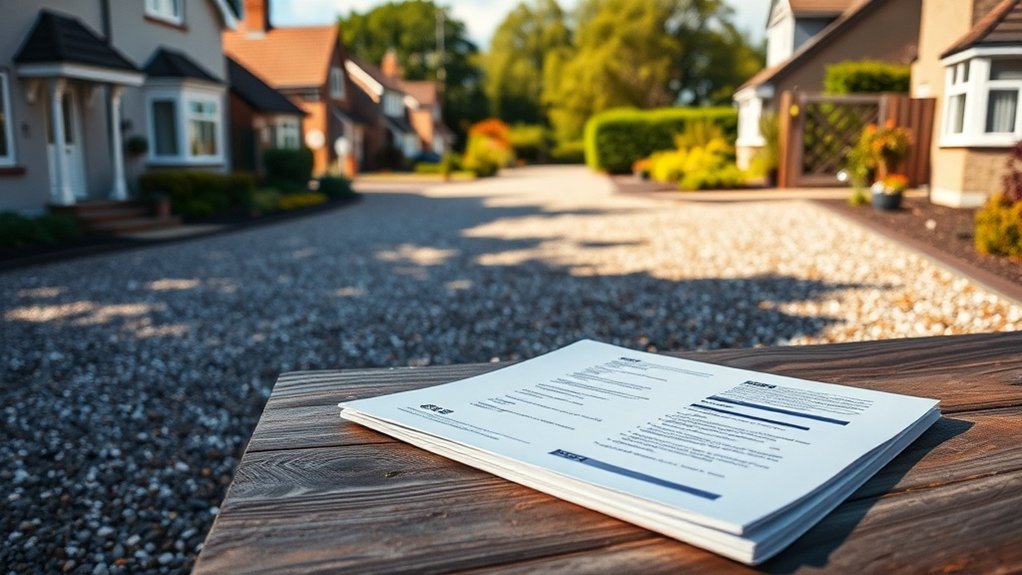
Planning Permission for Resin Driveways: What You Need to Know
Getting your resin driveway installation right means checking local planning rules first. In the UK, the rules are straightforward: resin-bound surfaces typically don’t need permission, as they let water drain through naturally. However, if you’re planning a resin-bonded surface larger than 5m² (about the size of a small garden shed), you’ll likely need approval due to flood risks. Additionally, it’s important to remember that permeable surfaces allow for flexible design and installation options, which can help you achieve the aesthetics you desire while staying compliant. Ensuring your driveway complies with SUDS requirements is crucial to minimize the risk of flooding and increase the likelihood of obtaining approval.
The rules get trickier for flats and converted properties – you’ll definitely want to check with your local council first. It’s a bit of a faff, but much better than facing enforcement action later, which could mean ripping up your new driveway.
Quick tip: Pop down to your local planning office or check their website before starting work. Most councils offer free guidance, and it’ll save you hassle down the line.
Environmental Regulations and Sustainable Practices
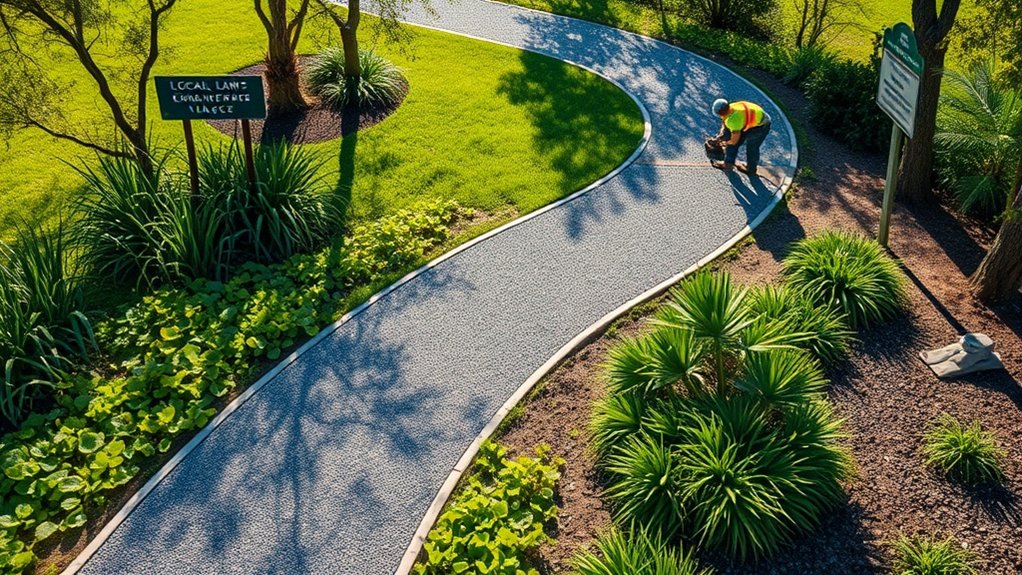
Environmental regulations and sustainable practices are vital when installing resin-bound gravel in the UK. Your project must comply with SUDS regulations, which help manage surface water and prevent flooding – a growing concern in British towns and cities.
Resin-bound surfaces naturally allow rainwater to soak through, making them an excellent choice for UK weather conditions. Permeable systems are designed specifically for applications like tree pits, ensuring that urban ecosystems remain healthy and resilient.
Implementing Sustainable Drainage Systems (SuDS) not only aids in effective drainage but also supports compliance with local council requirements. Using recycled materials, such as crushed glass and local stone, helps reduce waste and keeps costs down. Following FeRFA guidelines and getting BBA certification ensures your installation meets UK industry standards.
These measures aren’t just good for paperwork – they make your driveway or path more durable and environmentally sound.
The benefits are clear: less water pooling, better drainage, and a surface that works with nature rather than against it. For British homeowners, this means fewer puddles, reduced flood risk, and a more sustainable outdoor space that meets all local building requirements.
Installation Requirements for Resin-Bound Driveways
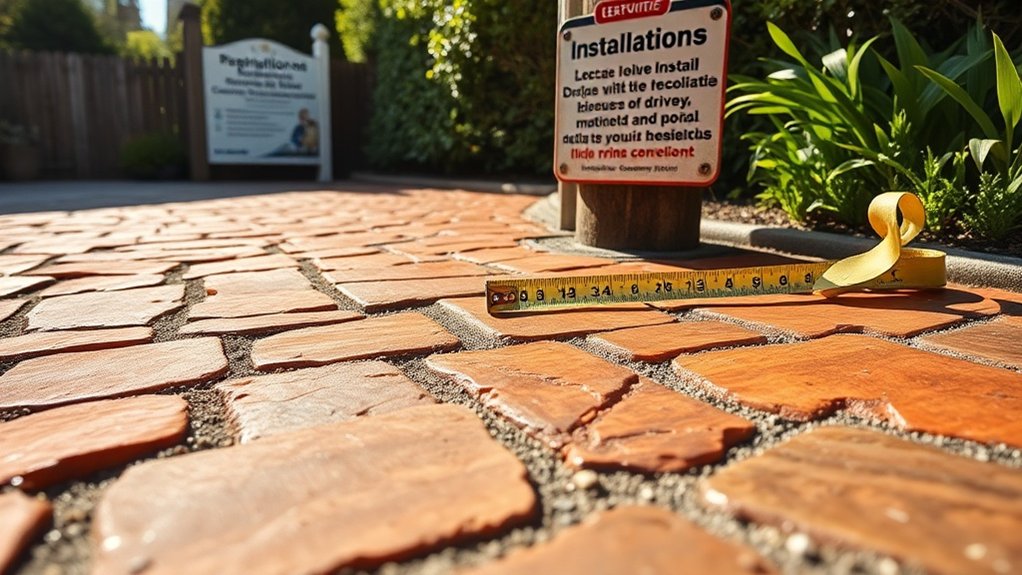
A solid resin-bound driveway starts with proper base preparation – it’s an absolute must. You’ll need both suitable drainage to stop puddles forming and robust edge restraints to keep everything in place. A well-prepared base ensures longevity and performance of the driveway, as it provides the necessary support for the resin and aggregate mixture. The sub-base thickness must match soil type and expected usage for optimal support. Skip these crucial steps, and you’ll likely face hefty repair bills down the line. Think of it like building a house: without proper foundations, the whole thing’s bound to fail, no matter how good it looks on top.
Base Preparation Essentials
Proper base preparation makes or breaks a resin-bound driveway.
Dig down roughly 150mm to fit both sub-base and resin layers. Your sub-base needs to be at least 100mm deep, using MOT Type 1 or Type 3 stone – these compact well and handle weight brilliantly.
Think of it like building a house; you wouldn’t skimp on foundations.
The surface must be dead level – any bumps now will show up later.
Give it a thorough going-over with a plate compactor; skipping this step often leads to dips and hollows months down the line.
Whether you’re laying over concrete or tarmac, the base must be sturdy enough for your expected traffic – from family cars to delivery vans.
Drainage Compliance Standards
Resin-bound Driveway Drainage Standards
Installing a resin-bound driveway in line with UK drainage regulations requires proper planning. Your driveway must include suitable drainage to comply with local council requirements, particularly if you’re using non-permeable materials.
| Compliance Aspect | Importance |
|---|---|
| Drainage Solutions | Prevents water pooling and damage |
| Compliance Checks | Certifies adherence to regulations |
| Sustainable Practices | Supports environmental goals |
Contact your local council before starting work to understand specific drainage requirements. A typical requirement might include installing drainage channels or soakaways. Getting it right first time saves money and hassle, whilst ensuring your driveway contributes to proper water management in your neighbourhood.
Edge Restraint Importance
Edge restraints are crucial for any resin-bound driveway‘s success. These borders, typically made from brick or aluminium profiles, hold the 15-18mm resin surface firmly in place. Proper restraints prevent gravel from spreading and protect the driveway edges from breaking down too soon.
Think of edge restraints like a picture frame – they keep everything exactly where it should be. When properly fitted, they stop the surface from shifting sideways and cracking under normal vehicle weights.
They’re also essential for proper drainage, which most UK councils now require for driveways.
Good edge design doesn’t just look smart – it’s a practical investment that helps your driveway last longer and meets local building regulations. Skimping on edge restraints often leads to costly repairs down the line.
Maintenance Obligations for Longevity and Compliance
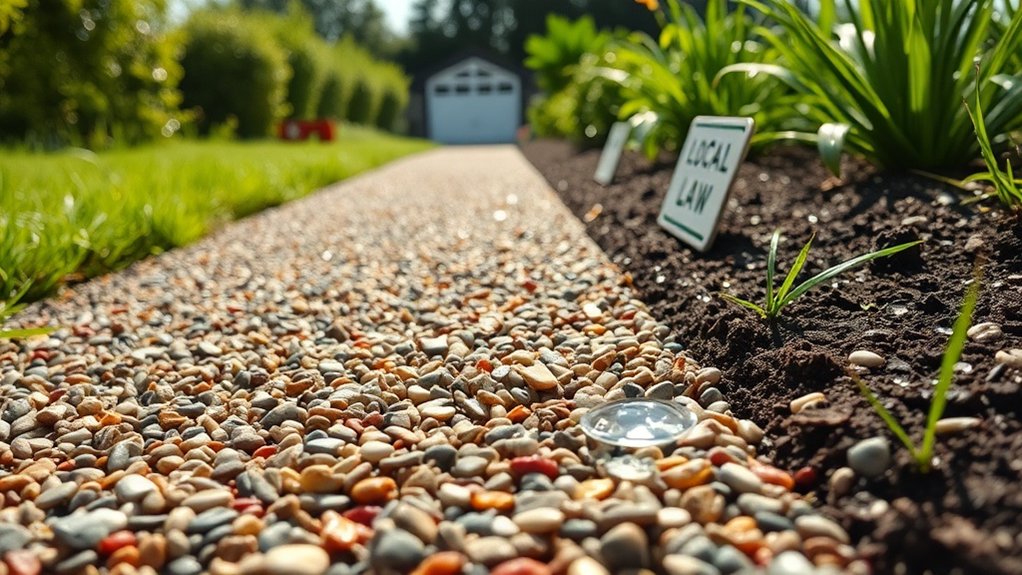
Maintaining Resin-Bound Surfaces
Regular upkeep ensures your resin-bound gravel surface stays compliant and lasts longer. Much like caring for a garden path, simple maintenance keeps it looking fresh and prevents costly repairs.
| Maintenance Task | Frequency |
|---|---|
| Sweep surfaces | Monthly |
| Pressure wash | 1-2 times yearly |
| Rinse with clean water | Regularly |
| Manual weed removal | As needed |
| Inspect for damage | Routinely |
Think of it like maintaining a car – regular checks prevent bigger problems. A quick monthly sweep, similar to brushing your driveway, removes debris before it can cause damage. Whilst pressure washing twice yearly keeps the surface looking smart, particularly after autumn leaves or winter grit.
Regional Variability in Regulations and Enforcement
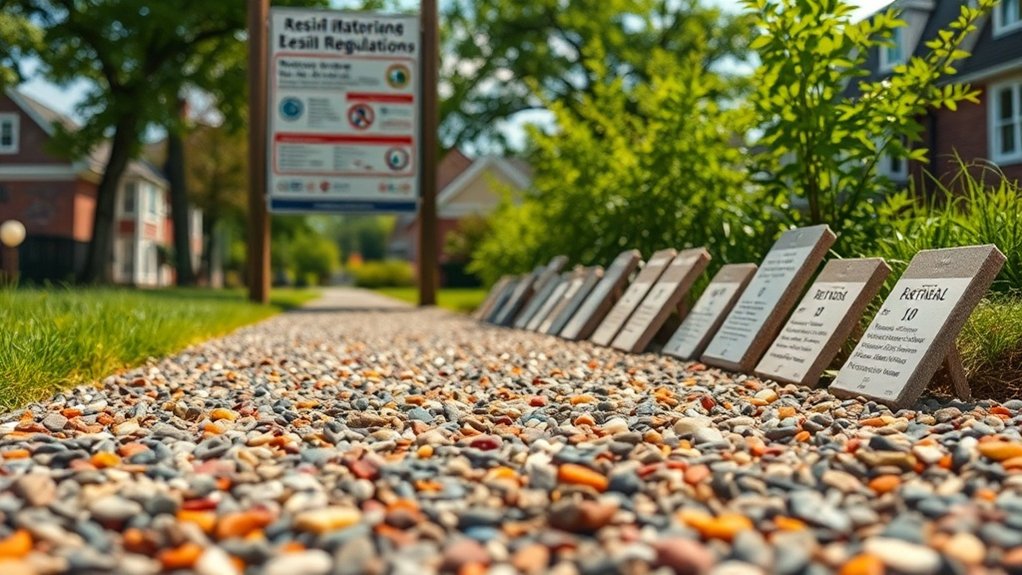
Regional Rules and Compliance for Resin Driveways
Understanding local regulations for resin-bound gravel installations varies significantly across the UK. These differences can affect your project’s timeline and costs.
- Many residential installations under 5 square metres don’t require planning permission in England.
- Larger projects, particularly in conservation areas or listed buildings, need council approval.
- Environmental regulations differ between councils, especially regarding drainage and waste disposal.
- Properties in flood-risk areas must meet strict Sustainable Urban Drainage Systems (SUDS) requirements, with regular checks.
Checking your local council’s specific requirements before starting work saves time and prevents costly mistakes.
Most councils offer clear guidance through their planning portals or building control departments.
Safety Standards and Performance Considerations

Ensuring safety and performance in resin-bound gravel installations means following key UK standards.
REACH Regulations require proper safety training, particularly when handling potentially harmful materials. For public works, BBA Certification proves that materials meet British quality and safety standards.
Anti-slip measures are vital – the surface must provide enough grip to prevent falls, which often means adding special additives to the mix.
The installation must also comply with SUDS requirements for proper drainage to stop water pooling and reduce slip risks.
Regular checks and staff training help maintain these safety standards.
Getting these basics right leads to safer, longer-lasting resin-bound surfaces that work well for everyone using them.
Frequently Asked Questions
What Are the Costs Associated With Resin-Bound Driveway Installation?
Resin-bound driveways cost between £40 to £70 per square metre in the UK, with yearly upkeep running £5 to £10. The final price depends on your choice of stones, labour charges and any council permits needed. For a typical single car driveway of 30 square metres, expect to pay roughly £1,200 to £2,100 before additional costs.
How Long Does Resin-Bound Gravel Typically Last?
A properly installed resin-bound gravel driveway typically lasts 10-15 years with regular maintenance. The durability depends largely on vehicle traffic, British weather conditions and the quality of resin used. Much like a well-kept garden path, consistent upkeep will ensure you get the most from your investment.
Can I Install Resin-Bound Gravel Myself?
Installing resin-bound gravel as a DIY project is possible but requires careful planning. Whilst you can save money, you’ll need specialist tools and proper technique to achieve professional results. Essential steps include thorough surface preparation and precise resin-to-aggregate mixing. Bear in mind that mistakes can be costly and difficult to fix, so if you’re not confident with large-scale DIY projects, it’s worth considering professional installation.
What Colors and Finishes Are Available for Resin-Bound Driveways?
Resin-bound driveways come in a vast range of colours, from classic neutrals like beige and grey to rich browns and charcoal. Popular choices amongst UK homeowners include traditional Yorkshire Buff and Cotswold Stone shades. The finish can be either smooth or textured – similar to fine gravel – depending on the aggregate mix chosen. Most suppliers offer sample swatches to help match your property’s existing colour scheme.
Are There Specific Brands Recommended for Resin-Bound Systems?
Leading UK resin brands include CANA Pave™, GCL Products and DALTEX. These manufacturers consistently receive strong feedback for their durability and finish quality. All meet British safety standards and building regulations, making them reliable choices for domestic and commercial resin driveways.
Conclusion
Local regulations for resin-bound gravel can make or break your project in the UK. Most councils require proper planning permission, particularly in conservation areas or listed buildings. You’ll need to check if your driveway project meets Sustainable Urban Drainage Systems (SUDS) requirements – a common stumbling block for many homeowners. Whilst resin-bound surfaces are generally permeable and SUDS-compliant, local authorities may still require specific documentation. Contact your council’s planning department early on to avoid costly mistakes or potential enforcement notices. Remember to factor in any specific maintenance requirements, as some councils have strict guidelines about upkeep and drainage standards.
